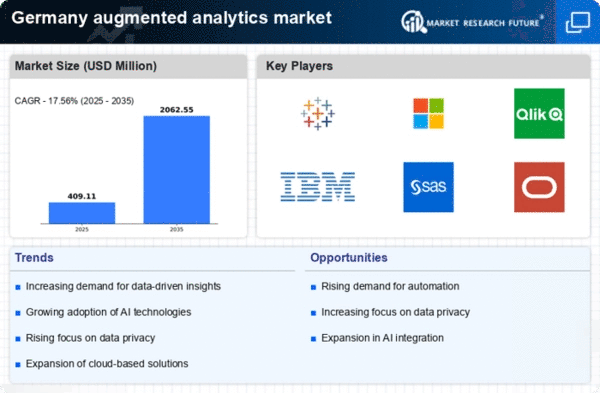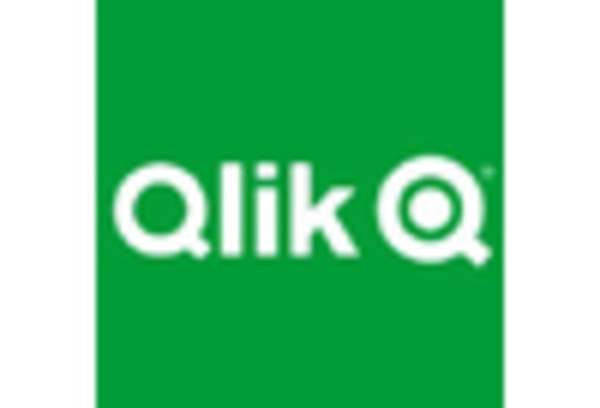Emphasis on Enhanced User Experience
In the augmented analytics market, there is a growing emphasis on enhancing user experience through intuitive interfaces and user-friendly tools. As organizations in Germany adopt these technologies, the focus is shifting towards making analytics accessible to non-technical users. This democratization of data analytics is crucial for fostering a data-driven culture within organizations. Companies are investing in platforms that offer visual analytics and natural language processing capabilities, enabling users to interact with data more effectively. This trend is expected to drive market growth, as it allows a broader range of employees to engage with data insights, ultimately leading to more informed decision making across various business functions.
Integration of Machine Learning Technologies
The integration of machine learning technologies into the augmented analytics market is reshaping the landscape of data analysis in Germany. Organizations are increasingly adopting machine learning algorithms to automate data preparation and analysis processes, which significantly reduces the time required to derive insights. This trend is particularly evident in sectors such as retail and finance, where timely decision making is crucial. The market for machine learning in analytics is expected to reach €1 billion by 2026, indicating a robust growth trajectory. As businesses continue to invest in these technologies, the augmented analytics market is likely to expand, offering innovative solutions that enhance predictive capabilities and improve overall data utilization.
Increased Investment in Cloud-Based Solutions
The shift towards cloud-based solutions is significantly impacting the augmented analytics market in Germany. Organizations are increasingly migrating their analytics operations to the cloud to benefit from scalability, flexibility, and cost-effectiveness. This transition allows businesses to access advanced analytics tools without the need for substantial upfront investments in infrastructure. The cloud analytics market is projected to grow by over 30% annually, reflecting the rising preference for cloud solutions. As companies seek to leverage the advantages of cloud technology, the augmented analytics market is likely to see a corresponding increase in demand for cloud-based analytics platforms that facilitate real-time data access and collaboration.
Rising Demand for Data-Driven Decision Making
The augmented analytics market in Germany is experiencing a notable surge in demand as organizations increasingly recognize the value of data-driven decision making. Businesses are leveraging advanced analytics tools to extract actionable insights from vast datasets, thereby enhancing operational efficiency and strategic planning. According to recent estimates, the market is projected to grow at a CAGR of approximately 25% over the next five years. This growth is fueled by the need for organizations to remain competitive in a rapidly evolving digital landscape. As companies strive to harness the power of data, the augmented analytics market is positioned to play a pivotal role in transforming how decisions are made across various sectors, including finance, healthcare, and manufacturing.
Focus on Regulatory Compliance and Data Governance
In the context of the augmented analytics market, the focus on regulatory compliance and data governance is becoming increasingly critical for organizations in Germany. With stringent data protection regulations such as GDPR, businesses are compelled to adopt analytics solutions that ensure compliance while maximizing data utility. This has led to a growing demand for analytics tools that incorporate robust governance frameworks and security features. As organizations prioritize data integrity and compliance, the augmented analytics market is expected to evolve, offering solutions that not only provide insights but also adhere to regulatory standards. This trend is likely to shape the future of analytics in Germany, as companies navigate the complexities of data governance.
















